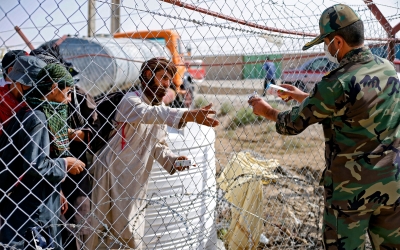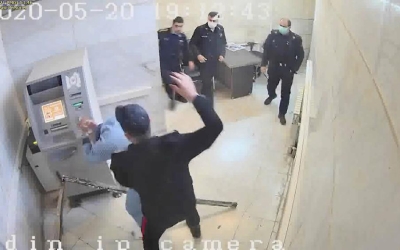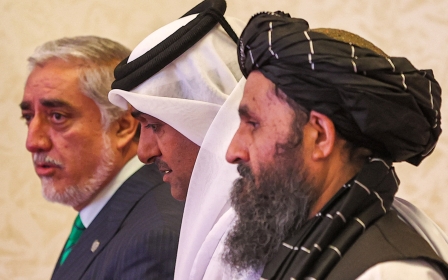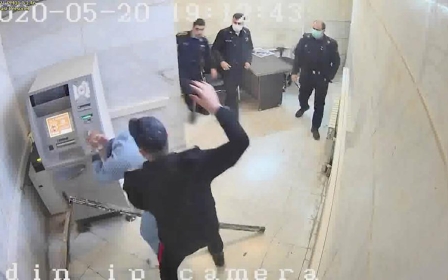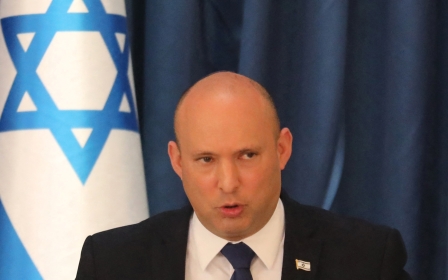Iranian press review: Tokyo expected to mediate between Tehran and Washington
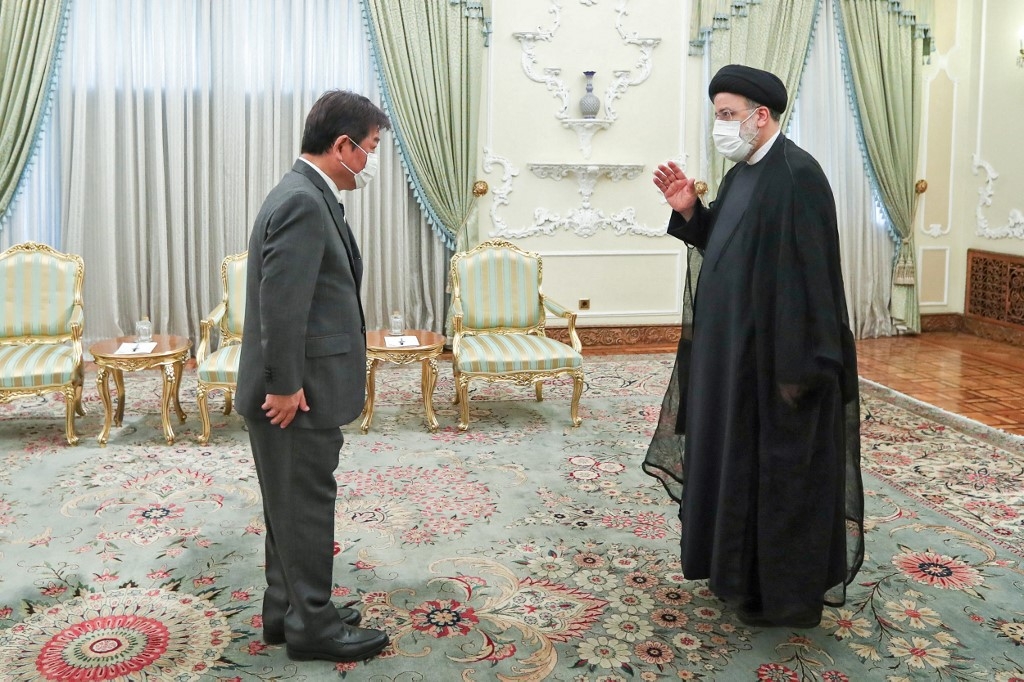
Will Tokyo mediate between Iran and US?
The latest visit to Tehran by Japan's foreign minister, Toshimitsu Motegi, has triggered speculation about Tokyo's potential future role as a mediator between Tehran and Washington for a return to the nuclear deal.
In his visit on 22 August, Motegi held meetings with Iran's outgoing foreign minister, Mohammad Javad Zarif, Secretary of the Supreme National Security Council Ali Shamkhani, and President Ebrahim Raisi.
'One part of Motegi's mission was carried out on behalf of the Americans, and regarding the issues related to the nuclear deal and other challenges between Iran and the US'
- Ali Bigdeli, Aftab daily
According to reports, Iranian officials urged Japan to release $3bn of its funds blocked by Tokyo after the US unilateral withdrawal from the nuclear agreement of 2015.
Meanwhile, Motegi urged Iran to return to the negotiating table at Vienna, stalled in mid-July following Raisi's victory in the presidential election.
New MEE newsletter: Jerusalem Dispatch
Sign up to get the latest insights and analysis on Israel-Palestine, alongside Turkey Unpacked and other MEE newsletters
Ali Bigdeli, Iranian academic and veteran foreign policy expert, told the Aftab daily that Motegi's visit to Tehran was on behalf of the politicians in Washington.
"One part of Motegi's mission was carried out on behalf of the Americans, and regarding the issues related to the nuclear deal and other challenges between Iran and the US," Bigdeli was quoted as saying.
Local media compared Motegi's trip to Tehran with that of Shinzo Abe, Japan's former prime minister, in January 2019, when he carried a message from Washington about former president Donald Trump's readiness to have direct talks with Iran.
In response to that message, Iran's Supreme Leader Ayatollah Ali Khamenei rejected any direct talks with the US, saying, "I don't consider Trump as a person worthy of exchanging messages with."
However, this time, Iranians foreign policy experts suggested that Tehran might have a different response.
The Javan daily, aligned with the Revolutionary Guards, wrote that "Iran is now evaluating and reflecting" on renewing talks over a return to the nuclear deal.
"However, it seems that Iran will avoid engaging in long talks," the daily wrote.
"Eight years ago [when the first negotiations began], the West had the upper hand, but now Iran has that status because it has nothing to lose," Javan concluded.
Brother of executed wrestling champion sentenced to 25 years
Iran's judiciary has handed down a 25-year sentence and rejected a retrial request by Vahid Afkari, a brother of Navid Afkari, an Iranian champion wrestler executed in September 2020.
Another brother of Afkari, Habib, had earlier been sentenced to 27 years in jail. Vahid and Habib have been kept in solitary confinement since the execution of their brother Vahid.
The three brothers were arrested during the 2018 anti-government protests. They were found guilty of killing a security officer in the city of Shiraz.
'You stole 25 years of Vahid's life, on the request of a security agency'
- Saeed, brother of Vahid Afkari
However, the Afkaris denied all charges at court, saying their confessions were under harsh physical and mental torture during the interrogations.
Afkari family's lawyer criticised the Supreme Court of Iran for acting against the law, saying that the case against his client has "24 contradictions and three false testimonies".
"Even if they had speed-read the file, like a newspaper, they would have seen the legal reasons and would have ordered a retrial," the lawyer wrote on Twitter.
Saeed, a third brother of Navid Afkari, was also outraged at the Supreme Court decision.
"You stole 25 years of Vahid's life, on the request of a security agency," Saeed wrote on Twitter.
Outrage in Iran after leaked prison torture videos
Video footage leaked from inside the notorious Evin prison in the Iranian capital Tehran on Sunday has sparked anger in Iran, forcing the authority to apologise over the conditions in which prisoners are kept.
On 22 August, Farsi outlets broadcasting outside Iran published footage they received from a hacker group calling itself Edalat-e Ali (Ali's Justice). The videos appeared to show guards beating prisoners and inmates fighting with each other.
In one clip, a prisoner smashed a bathroom mirror in an attempt to cut open his arm. Another showed a man, who appears to be emaciated, collapsing after being dropped off by a car, then being dragged through the prison. At one point, a religious cleric walks straight past the man lying on the ground, without stopping.
The leak has prompted a confirmation and an apology by the country's prison authority.
In response to the shocking CCTV videos, Iranians took to social media voicing their anger against the prison system in Iran, and criticising President Ebrahim Raisi for his role in creating such circumstances when he was the country's deputy chief justice and chief justice.
"Iran's President Ebrahim Raisi praising the 'kindness and Islamic grace' of Iran's prisons, contradicted videos recently obtained from security cameras inside Tehran's Evin prison, home to many political prisoners," Karim Sajadpour, Iranian academic, wrote on Twitter.
"These are just seconds from [over] 40 years of cruelty in Evin prison … seconds from millions of lashes, torture, shooting and hanging," wrote another Iranian social media user.
Iranian politicians have also reacted to the release of the videos, blasting the authorities for prisoners abuse.
Mahmoud Sadeghi, an outspoken former lawmaker who received a 21-month prison sentence in May 2020, was a prominent political figure who urged Gholam Hossein Mohseni Ejei, Iran's chief justice, to end the torture and abuse of prisoners.
"During the past four decades, prisons conditions have made the news from time to time, and received short-term responses; however, never a meaningful move was made to change the situation," Sadeghi wrote in an open letter to Mohseni Ejei, local media reported.
Meanwhile, Heba Morayef, Middle East and North Africa regional director at Amnesty International condemned inmates' treatment at Iranian prisons, calling the leaked videos "the tip of the iceberg".
"This disturbing footage offers a rare glimpse of the cruelty regularly meted out to prisoners in Iran," Morayef said.
"It is shocking to see what goes on inside the walls of Evin prison, but sadly the abuse depicted in these leaked video clips is just the tip of the iceberg of Iran's torture epidemic," she added.
It is not the first time reports about torture in Iranian prisons were published. But officials have always denied those reports.
For the first time, the leaked videos provided indisputable documentation showing examples of torture in Iranian prisons.
*Iranian press review is a digest of news reports not independently verified as accurate by Middle East Eye
Middle East Eye delivers independent and unrivalled coverage and analysis of the Middle East, North Africa and beyond. To learn more about republishing this content and the associated fees, please fill out this form. More about MEE can be found here.


